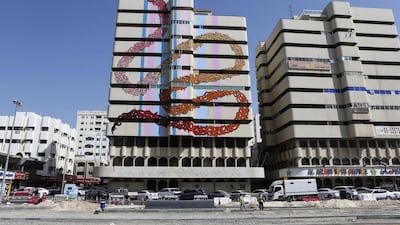Armed with bags of spray cans in shades of orange, red, yellow and pink, eL Seed has spent the best part of the last two weeks standing on a crane-supported platform working on his latest piece of calligraffiti. The completed mural – letters in the French-Tunisian artist’s distinctive style and sprayed on a striped background – now snakes up one of the walls of an abandoned building on Sharjah’s Bank Street. It is the first time the internationally renowned street artist has painted a public space in the UAE.
Art for everyone
The colourful mural is a part of a new public art initiative called Jedariya (Arabic for walls), launched by Maraya Art Centre.
“We want to create landmarks for the many diverse communities living here,” says centre director Giuseppe Moscatello. “Sharjah is home to so many different people from all over the world, yet the one thing we have in common is the public, urban space that we share,” he says. “The demography at the heart of Sharjah is very important to us.”
Marwan Al Serkal, the chief executive of Sharjah Investment and Development Authority (Shurooq), which owns the Maraya Art Centre, says Sharjah’s public art initiative began with Maraya Art Park, which was launched in 2013 as a place to give visitors an opportunity to experience art outdoors, away from the walls of a typical art gallery.
“By bringing world-class art projects into our beautiful emirate’s public areas we want to not only foster an appreciation of the arts among all, but also attract artists and art lovers from Sharjah, the UAE, and all over the world as well as encourage and inspire young artists to develop their talents and aspire to greatness,” he says.
eL Seed in the UAE
Over the past year, eL Seed has lived and worked in the UAE, completing a residency at Dubai's Tashkeel. During this time, he painted a wall at Zayed University and inside the Emirates International School in the Meadows. And for his solo show at Tashkeel in November, he created larger-than-life sculptures of three-dimensional letters titled Declaration, a testament to his love for calligraphy.
The words he chose for the Sharjah wall – rendered in his trademark and easily recognisable style – are from a poem by 19th-century Iraqi poet and calligrapher Ahmed Bu Sneeda, who lived and worked for most of his life in Sharjah. The poem is a monologue with a loved one, in which the poet laments: “I speak to you but you do not reply; I visit but you do not visit me.” It was so revered that it became a popular song for residents of Sharjah but for eL Seed it also has modern cultural connotations.
“I chose it firstly because the poet was a calligrapher, he taught many people calligraphy in Sharjah and the poem was well-known by everyone,” says the artist. “But I also liked its meaning: it was written in the 19th century but it is relevant to our time where we use social media so much that we are end up having conversations with ourselves.”
Words of beauty
eL Seed’s work is characterised by the thought behind the content of his calligraffiti. Not only are his letters beautifully crafted and well executed, he also zeroes in on a phrase, quote or motto that goes to the heart of the matter.
In South Africa, for example, he used a quote from Nelson Mandela – "It is impossible, until it's done" – to decorate a wall in Philippi, Cape Town. On the crumbling set of Star Wars in Tunisia, his home country, he inscribed: "I will never be your son", a reference to the characters Luke Skywalker and Darth Vader as well as a defiant statement against a government decision to protect the film set over the ancient Berber castles that represent Tunisia's real heritage. In Paris, where he was born and raised, he sprayed the words "Love is the miracle of civilisation" on the side of L'Institut du Monde Arabe.
This is eL Seed’s last project in the UAE before he leaves later this week to travel home to Paris. He will head to Vancouver in March, where he is one of the speakers at the annual TED conference.
“It would have been a shame for me to leave the UAE without doing one public wall, so I am really happy we managed to it,” says el Seed. “I hope it will open up more opportunities for other artists.”
• eL Seed’s latest artwork is on Bank Street, Sharjah Heritage Area. For more information, visit www.maraya.ae
aseaman@thenational.ae
Jedariya: into the Future
Jedariya started two years ago with the idea of setting up public art projects across Sharjah. The first realised project was Maraya Art Park, a space for public contemporary artworks. With Jedariya, however, the focus is much more on street art and the link between society and artists.
Maray Art Centre director Giuseppe Moscatello says this decision was primarily because “the message communicated through street art is stronger than that of other public art and we want to engage with the people from the communities”.
Moscatello believes that it is important to bring art to those places where you can “find the soul of the city”. He suggests that there will be future projects in the heart of Sharjah’s heritage area as well as on the road from Dubai to Sharjah, where there are “buildings with character and display the history of the city”.
Moscatello points out that logistically, it is difficult to secure buildings and appropriate venues for public art in the UAE, so future projects are yet to be worked out. Watch this space.
* Anna Seaman

